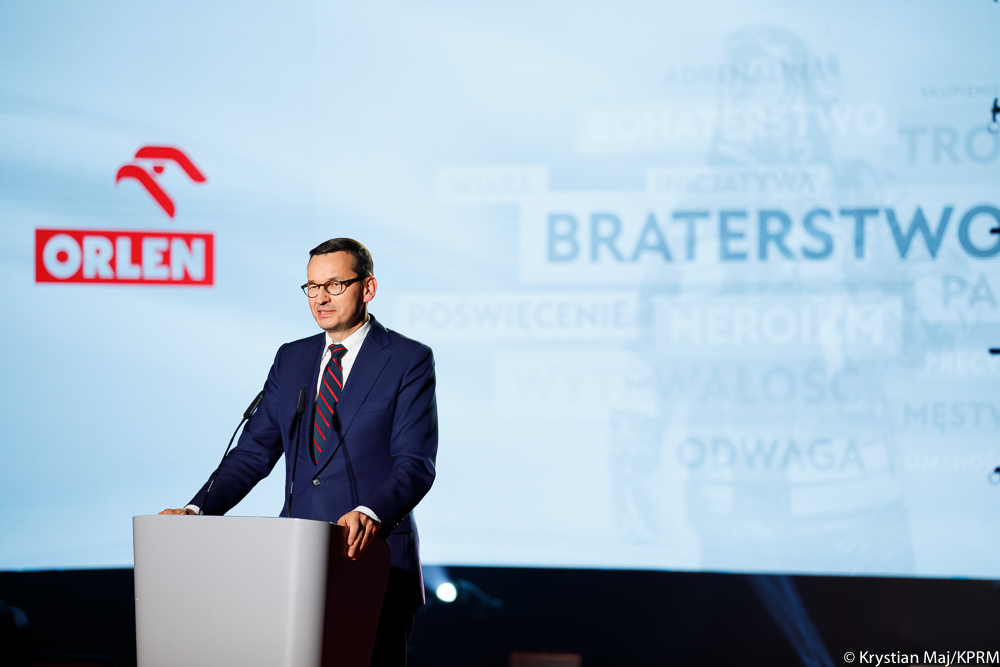Poland’s government has unveiled a proposed media tax which will introduce a levy on advertising revenue of television and radio broadcasters, print outlets and internet media companies. Higher rates will apply to advertisements for products deemed to be harmful, such as sweetened beverages.
Discussing the plans, Prime Minister Mateusz Morawiecki said that the tax, which he called a “solidarity fee”, will “create better conditions for the development of free media” and is part of European efforts to tax digital service giants.
Media companies in Poland have, however, expressed worries that the new levy would amount to an attack on freedom of the press and would create “an additional burden that the industry can no longer bear”.
Speaking to wPolsce.pl television, Morawiecki noted that the levy is “nothing new” and was “something we agreed on in the European Union some time ago” as “a digital tax for part of the internet”.
Brussels has been working on a common solution to crack down on multinational digital players who pay little in the way of corporate tax in Europe. The Polish finance ministry says that measures similar to the one it is implementing are already in place in France, Austria, Greece and Hungary.
However, while the proposed Polish tax will apply to companies with global revenues above €750 million whose advertising revenue in Poland exceeds €1.1 million – such as Facebook and Google – the legislation will also introduce levies on domestic media players, including for non-digital advertising revenue.
According to analysis by Wood&Company, an investment bank, the hardest-hit companies in Poland will likely include Agora (publisher of the Gazeta Wyborcza daily), American-owned broadcaster TVN and Ringier Axel Springer Polska (the Swiss-German owner of, among others, Fakt, Newsweek Polska and Onet).
Titles belonging to those groups are often critical of Poland’s ruling national-conservative Law and Justice (PiS) party. Wood&Company, whose analysis is cited by Business Insider Polska, finds that Wirtualna Polska – a popular internet portal – and Polsat, a broadcaster, would likely be least affected.
Some in the media industry have expressed concern regarding the new measures, saying that they will hit already-struggling businesses and warning that they will have a particular impact on independent, private outlets.
In an op-ed, Bogusław Chrabota, editor-in-chief of the Rzeczpospolita daily, notes that that, as a result of the pandemic, the industry has already been hit by shrinking advertising revenues and a drying up of other revenue streams, such as conferences and workshops.
Chrabota said that the tax is perceived as “an attack on free media” and linked to PiS’s efforts to “repolonise” and “deconcentrate” the industry, which many see as veiled attempts to crack down on outlets critical of the government.
Krzysztof Kajda, deputy head of the Lewiatan Confederation, a business lobby group, said the law aimed at cutting off private media from their main source of income, reports Press.
“We have no doubt that this regulation will have a negative impact on the private media market in Poland, increasing investment uncertainty and limiting its development,” he wrote in a statement.
The finance ministry forecasts that the tax could boost the state budget by 800 million zloty (€178 million) in 2022. Half of the revenue generated is meant to bolster the National Health Fund (NFZ), which finances public healthcare, and 15% will be channelled to the National Monument Protection Fund (NFOZ).
The remaining 35% will be used to set-up a Fund for Support for Culture and National Heritage in the Media, which is intended to co-finance projects related to “changes in the digital space, culture and national heritage”, according to the finance ministry.
In his remarks yesterday, Morawiecki also said he was “happy about” the recent purchase by state oil form Orlen of Polska Press – a media firm that owns hundreds of local newspapers and websites – from its German owner.
“Media are of great importance for shaping public opinion,” said the prime minister, and therefore “should not, especially to this extent, belong to foreign owners”.
Correction: This article has been updated to reflect the fact that some public media outlets will have to pay the levy, contrary to initial reports. We apologise for the error.
Main image credit: Krystian Maj / KPRM (under public domain)

Maria Wilczek is deputy editor of Notes from Poland. She is a regular writer for The Times, The Economist and Al Jazeera English, and has also featured in Foreign Policy, Politico Europe, The Spectator and Gazeta Wyborcza.




















